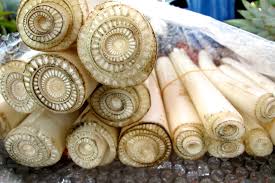By Akanimo Sampson
Fusarium wilt, popularly known as Panama disease, is a soilborne fungal disease.
It is responsible for the crop’s declining yield in the Great Lakes region of Africa, where banana is a major source of food and income for millions of smallholder farmers.
The disease is spread by the fungus Fusarium oxysporum f. sp. cubense (Foc), which enters the root systems of banana plants and blocks the uptake of nutrients and water.
It causes yellowing of leaves, splitting of the pseudostem, and eventual death of the banana plant. Furthermore, the disease cannot be managed by synthetic pesticides/fungicides and easily spreads through the exchange of planting materials (banana suckers), water, and movement of people and equipment.
All traditional East African highland cooking banana (EHAB) known as Mchare and some dessert bananas like Sukari Ndizi are susceptible to this disease. However, it was observed that only a proportion of the plants die after infection.
A team of researchers from IITA is seeking to understand this phenomenon of microorganisms—bacteria and fungi—surrounding the roots as well as in the roots and corm.
This is called the soil microbiome.
They suspected that soil microbiome interaction with the banana plant provides some defense against the fungal pathogen. And if true, this may pave the way for the development of biocontrol products to protect banana against the disease using soil microorganisms.
They were able to establish a correlation between the level of microbiome diversity with the resistance to the pathogen invasions in the roots.
“This study allowed us to have a better understanding of the root microbiome in banana that can be harnessed to develop novel disease management tools in Mchare based on beneficial microorganisms (endophytes and biological control agents) for smallholder farmers in sub-Saharan Africa”, says Manoj Kaushal, an IITA Systems Agronomist, based in Dar es Salaam, Tanzania, who led the study.
The researchers profiled the root microbiomes of banana both with and without symptoms of the disease. Each sample showed substantial differences in the community composition and species abundance.
The beneficial bacteria identified in the root samples included Actinomycetales, which are known to produce various metabolic compounds that help to suppress various plant and soilborne pathogens.
Others were Pseudomonadales, well-known to be responsible for beneficial plant-microbe interactions, and Streptomycetaceae, which are known to produce antagonist compounds against various plant pathogens.
Future research will be focused on the isolation, characterization, and screening of various indigenous microbial strains with the target to develop a product from these microbial strains (single or consortium) that will provide enhanced tolerance against banana Fusarium wilt disease to boost the production of banana in the region.
The IITA banana research programme aims to improve soil health and increase the yields of the EAHB more sustainably.

